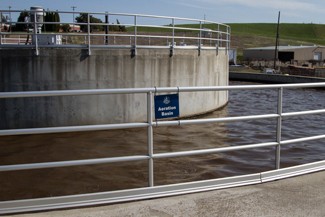Wastewater treatment plant in Moscow is improving the quality of water in Paradise Creek
Nestled behind a row of trees, the wastewater treatment plant for the city of Moscow quietly does its job.
Each day, it receives over 1.9 million gallons of raw sewage to be treated and drained into Paradise Creek.
“We are a biological nutrient removal, activated sludge plant,” Todd Swanstrom, the plant supervisor said. “It is natural. It is the way Mother Nature wanted it.”
The water discharged into Paradise Creek has improved the quality of the water and life in the creek downstream of the plant, Swanstrom said. Because the plant removes most of the toxins and adds oxygen to the water, the creek has been improved.
Once the inorganic material is removed from the raw sewage, the water is sent to the 208,000 gallon Anaerobic Basins — giant tanks of water that hold millions of microorganisms that break down the solids and nitrates from the sewage, Swanstrom said.
The microorganisms produce phosphorus at this stage as a byproduct of breaking down the solid waste. Some phosphorous is also present in the water before this stage. The plant removes 97 percent of the phosphorus before the water is discharged in the creek.
“It overgrows the creek and kills it,” Swanstrom said.
The water is then transferred to the clarifier, where the water rests and the solids sink to the bottom, Swanstrom said.
During this stage, the microorganisms suck up the phosphorus in the water as they sink to the bottom of the tank. The sludge is sent to a building where the excess water is removed. Latah Sanitation then composts the sledge and turns it into garden fertilizer.
“They take our solid material and commingle it with tree branches and grass,” Swanstrom said. “This is sustainable. We are using something that humans didn’t want. It is something that is benefiting Mother Earth.”
The water is put in another tank, where it is agitated so oxygen from the air will dissolve into it.
“The fish love it,” Swanstrom said. “(The water) is full of oxygen, it is easier for them to breathe.”
Before it is discharged into the creek, the water is run through a sand filter, which removes the remaining phosphorus, Swanstrom said. The water is also treated with chlorine to kill any remaining toxins. The chlorine is removed from the water before it enters Paradise Creek.
“It is remarkable to me that this is all done through biological activity,” Swanstrom said.
Mayor Bill Lambert honored the Wastewater Treatment Plant Monday with an Earth Day award. For the last four years, the plant has met the standards for water quality set forth by the Environmental Protection Agency, Swanstrom said.
“I love it whenever we get a chance to brag about one of the departments in the city,” Lambert said. “It is one of those things we as citizens take for granted, but it is a big deal.”
Graham Perednia can be reached at [email protected]


